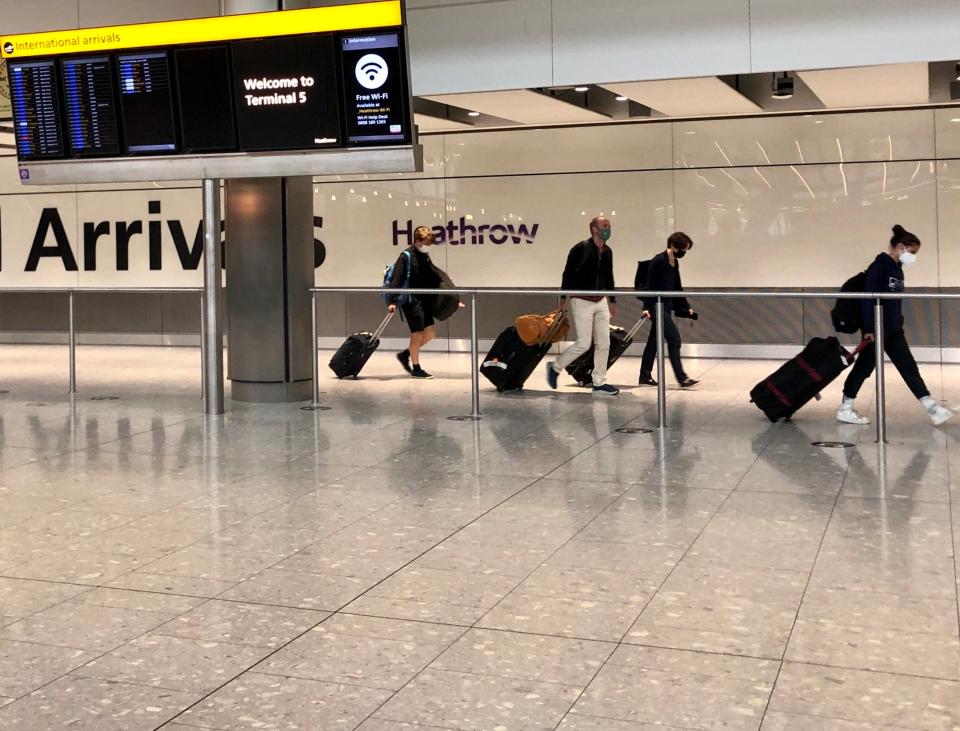Vaccines replace quarantine for arrivals from US and Europe – except France

The government’s refusal to recognise vaccinations administered outside the UK has ended. Since 4am, travellers from most EU nations, eight other European countries and the US who have been fully vaccinated against coronavirus can travel from “amber list” countries without needing to self-isolate when entering the UK.
The first people to benefit were American passengers on board British Airways flight 112 from New York JFK, which touched down at London Heathrow just after 6am.
What has changed?
For the past two weeks, arrivals from medium-risk amber list countries such as Spain, Portugal, Italy and Greece have been able to avoid self-isolation – so long as they have been fully vaccinated by the NHS in the UK.
The government is now extending the same concession to arrivals from the US and 25 EU nations, plus Switzerland, Norway, Iceland and five small European countries.
Prospective travellers to the UK must “test to fly” before departure and pre-book a PCR test to be taken on arrival, or one of the two following days.
The concession does not apply to arrivals from mainland France, because of fears about the presence of the “Beta variant” of Covid-19 on the Indian Ocean island of Réunion. They must self-isolate for 10 days, regardless of vaccination status. But travellers from Réunion itself can avail of the option if they avoid mainland France.
Travellers from Ireland to the UK continue to enjoy “super green” status, with no checks or tests.
What proof is required?
For Europeans, the EU Digital Covid Certificate; for Americans, the Centers for Disease Control and Prevention vaccination card, as well proof that the traveller “is ordinarily resident in the United States of America”.
Does that mean people who’ve arrived in the past 10 days and are quarantining can stop?
No. Once you have started self-isolating, there are only three ways out: complete the 10 days of quarantine; pay for and take another test on day five if you’re in England; or leave the country.
Can British travellers go to any of those countries without restriction?
No. The most obvious barrier is the United States, which has been off limits since March 2020 through a series of presidential proclamations which ban non-Americans who were “physically present” in the UK “during the 14-day period preceding their entry or attempted entry into the United States”.
There is no indication that Joe Biden might end the prohibition – which also applies to most other European countries – any time soon. Some people are circumventing it by spending two weeks in Mexico.
Other countries have general travel bans against arrivals from the UK, including the Netherlands and Belgium, while Italy insists on five days’ of quarantine.
Who will benefit most from this?
British expatriates who have been jabbed abroad and want to come home; families of people living in the UK who haven’t seen them for many months; and perhaps some tourists and business travellers, who have been effectively kept out all year.
Is the concession likely to be extended?
Yes, for example to eastern European countries such as Serbia, Montenegro and Albania, as well as further-flung countries with strong connections, such as Canada and Morocco.
When will the next changes take place?
Probably next Monday at 4am, after the next round of “traffic light” changes is announced on Thursday by the transport secretary, Grant Shapps.
There are hopes that some countries such as Portugal and Poland may go on to the “green list,” but fears that others could be moved to the mandatory-quarantine “amber plus” category.
What does the travel industry think of the changes?
The bosses of Britain’s airlines have written to the transport secretary, Grant Shapps, saying the changes represent a positive step, but that the UK has “fallen far behind our competitors”.
While Germany has recovered to 60 per cent of pre-pandemic flights, and France is 48 per cent, the UK – previously by far the leading aviation nation in Europe – is languishing at 16 per cent of 2019 levels.
The chief executives of British Airways, easyJet, Jet2, Ryanair and Virgin Atlantic are demanding a reduction to “the still onerous and increasingly disproportionate burden of testing on travellers,” which they call a £100 tax on flights.
They also say “green list” status with no quarantine regardless of vaccination status should become the default. At present the presumption is that a country is amber.
“Time is fast running out to put the UK’s aviation, travel and tourism industries back on track for a sustainable recovery to protect the millions of jobs they support,” they say.
“We cannot afford to stand still over this vital summer period, and urge you to act.”
What does the government say?
The transport secretary, Grant Shapps, said: “We’ve taken great strides on our journey to reopen international travel and today is another important step forward.
“Whether you are a family reuniting for the first time since the start of the pandemic or a business benefiting from increased trade – this is progress we can all enjoy.”
The health secretary, Sajid Javid, said: “By reopening quarantine-free travel for travellers who have been fully vaccinated in European countries and the US, we’re taking another step on the road to normality which will reunite friends and families and give UK businesses a boost.”
Read More
Amber list countries - full updated list
What is the ‘amber plus’ list and what is on it?
How to get a PCR test for travel - the cheapest ways to buy one

 Yahoo News
Yahoo News 